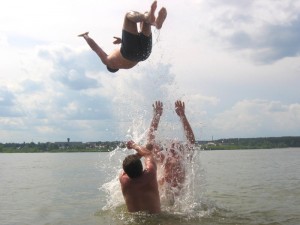What is a contact lens wearer to do when playing in the pool, river or ocean? Water activities are more fun without worrying about losing glasses or not being able to see. Two of the many advantages to wearing contacts instead of glasses is the freedom to use non-prescription sunglasses, and to see without glasses.
Unfortunately, there are all kinds of nasty bugs living in swimming pools, oceans, lakes, hot tubs and even tap water that can attach to your contact lens and cause serious damage to your eyes. That’s why you should avoid swimming with contact lenses whenever possible. If you do decide to wear contacts while swimming, remove, clean and disinfect your lenses immediately to reduce your risk of eye irritation and infection. Better yet, wear swim goggles; when it comes to the health of your eyes it’s always best to be safe than sorry!
I do fit individuals with contacts specifically for water activities such as surfing and water-skiing. In these cases, I prescribe daily use contact lenses to prevent reintroducing any contamination into the eyes. And overnight wear is absolutely forbidden as sleeping in the contacts increases the risk of corneal edema and abrasion, leaving the eye vulnerable to infection.
If you are missing the fun of water activities, consider daily use contact lenses that you can throw away after a day of fun.


